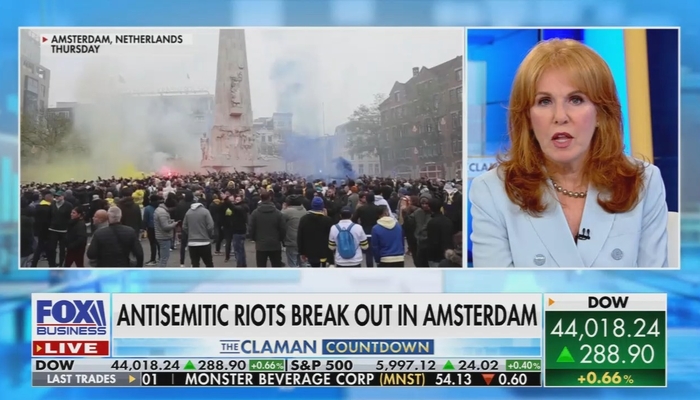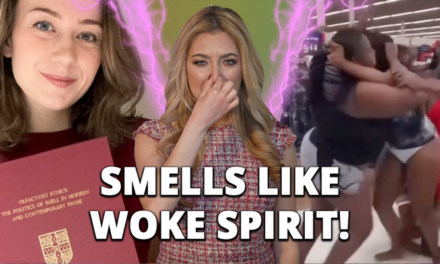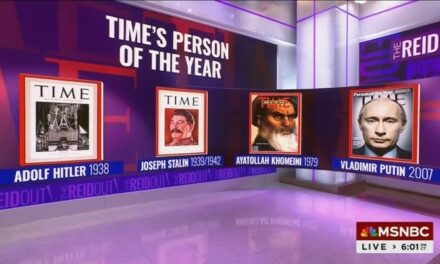We support our Publishers and Content Creators. You can view this story on their website by CLICKING HERE.

Marc Tracy, arts and culture reporter for the New York Times, for some reason wrote a 2,100-word “news analysis,” posted Sunday, on why Jews shouldn’t use the word “pogrom” to describe assaults like the one in Amsterdam against people suspected of being Jews, after a soccer match by an Israeli team there: “The Amsterdam Attacks and the Long Shadow of ‘Pogroms’ — Many have used an old word to refer to recent events. Is it accurate?” The Times doesn’t seem to think so, given it put the word in quotation marks.
Tracy worked to underplay the dangers Jews face around the world, and offered some potential mitigating circumstances to explain the latest violent anti-Semitic rampage, with marauding Jew-haters on mopeds going on an actual jodenjacht — “Jew Hunt.” All inspired by the deadliest attack on Jews since the Holocaust, committed by Hamas on October 7, 2023.
Femke Halsema, the mayor of Amsterdam, may have touched off a diplomatic incident last week when she said on a Dutch television show that she regretted having used the word “pogrom” the day after attacks on Israelis in her city surrounding a soccer match.
Since the incidents, which began late on the night before the Nov. 7 game, Ms. Halsema, a member of the Green Party, said she had seen “the word politicized to the point of propaganda.” In response, Gideon Saar, Israel’s foreign minister, called Ms. Halsema’s statement “utterly unacceptable.” Referring to the attacks, he said, “There is no other word for this than a pogrom.”
The word “pogrom” described loosely organized, often deadly riots by local Russians or Eastern Europeans against Jews from the 1880s through the end of the Bolshevik Revolution some 40 years later….
The eagerness of Mr. Saar to reaffirm the word — echoing statements made by Israel’s president, Isaac Herzog, and Deborah Lipstadt, the U.S. State Department’s special envoy to monitor and combat antisemitism — reflected the international Jewish community’s increased sensitivity to antisemitism in the year since Hamas led an attack into Israel on Oct. 7, 2023, that killed 1,200 and kidnapped about 250 others.
At the same time, Ms. Halsema’s hesitance to use “pogrom” amplified the concern that such rhetoric is being deployed to forward an agenda against Muslims. The Dutch politician Geert Wilders, who also used the word, leads a far-right party that won a plurality of votes last year on a platform that called for ending immigration from Muslim countries, taxing head scarves and banning the Quran. Mr. Wilders has called Moroccan immigrants “scum.”
Surely Tracy is not trying to hint here that Jews bore some responsibility for being attacked in Amsterdam?
“Pogrom” has a historical association with European antisemitism, inflicted in czarist Russia and elsewhere on largely defenseless Jews. The antisemitic attacks in Amsterdam had a different context: international outrage over Israel’s destructive war in Gaza that followed Hamas’s attack.
Tracy went on to imply that Jews in Europe and elsewhere are overreacting (are those “liberal democracies” really protecting Jews?). And how does a well-armed IDF help a soccer fan survive being kicked in the teeth in The Netherlands?
Even aside from the Dutch situation, there is a concern for many in the Jewish community and beyond that using “pogrom” is inaccurate or inappropriate at a time when most Jews live either in liberal democracies that are committed to protecting their rights as minorities or, of course, in a sovereign Jewish state with a famously well-armed military.
Later it was time for blaming the victim.
On the night of Wednesday, Nov. 6, some fans of Maccabi Tel Aviv, a prominent club that had traveled to Amsterdam to play the Dutch squad Ajax in a league soccer match, chanted incendiary and racist slogans, pulled down a Palestinian flag and attacked a cab. Palestinian solidarity has been amply displayed in Amsterdam during the past year of a war that has killed tens of thousands of Gazans, including many women and children.
The Times managed not to mention Muslims as the Amsterdam attackers, but did claim that Muslims have historically also been victims of “pogroms.”
The same night, Amsterdam cabdrivers — many of whom are of Moroccan or Turkish heritage — answered a call spread over apps such as Telegram to gather outside a casino holding hundreds of Israeli fans. A security guard at the casino promised to tip others off should the fans show up again. “Tomorrow after the game in the night,” a participant replied, “part two of Jew hunt.”
After the match the next night, Israeli fans were assaulted in hit-and-run attacks. Online videos indicate that victims were targeted for being Israeli or Jewish. Five Israelis were hospitalized and discharged, and there were a few dozen injuries, said the police, who detained more than 60 people (including some from Israel).
Tracy seemed to hold out the possibility that the Jews had at least somewhat “incited” the attacks, in defiance of all the recorded timelines of what happened over the two nights (the attacks on Maccabi fans were pre-planned). By that logic, Jews would be justified attacking any pro-Hamas rally using the eliminationist slogan “From the river to the sea! Palestine will be free!”
The inciting and violent behavior of the Maccabi fans does not mean that what happened next cannot be considered a pogrom, scholars said. Russian pogroms often flared during moments of political crisis amid rumors that Jews had committed provocations….
The Times reporter seemed determined to be irresponsibly provocative: A pogrom perpetrated by Jews?
In fact, most scholars agree that a pogrom could be perpetrated by Jews. Observers sympathetic to Palestinians, including some Israelis, have called an attack last year by Israelis on the town of Huwara, in the Israeli-occupied West Bank, a pogrom. In 1983, an official Israeli commission said attacks committed by Christian militias the previous year at two Palestinian refugee camps in Lebanon were “massacres and pogroms” for which Israeli leaders deserved “indirect blame.”
Again Tracy suggests there was a “both-sides” aspect to the attacks on Jews.
A modern strain of conservative Jewish thought finds one all-consuming root cause for anti-Jewish incidents: ineradicable antisemitism….But for Israeli critics of the current government like Mr. Dekel-Chen, deploying “pogrom” short-circuits the contemplation of other, more contingent developments that may have empowered Israel’s enemies.
What “contingent developments” could possibly justify violent anti-Semitic assaults?

 Conservative
Conservative  Search
Search Trending
Trending Current News
Current News 





